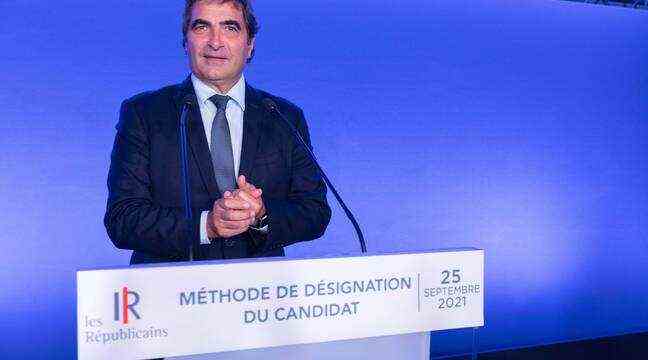No primary for LR. The Republicans will nominate their presidential candidate by a vote of their members only. On Saturday, they were the ones who electronically chose the 58% option of a two-round congress. A vote where the participation rate reached 50.28% of the votes, and which specifically concerned a modification of the statutes, which since 2015 provided for a primary. “This is good news, it allows December 4 that the debate is closed”, and that the right is “gathered behind a union candidate”, welcomed the party boss Christian Jacob. Candidates will have to formulate their will to launch in writing, he said.
“I will be! May the best one win! “, Immediately tweeted the president of the Ile-de-France region Valérie Pécresse. “Faithful activist in this family (…) I will confidently solicit his support”, also assured Michel Barnier. It remains to be seen whether this method of designation will convince Xavier Bertrand, favorite on the right, to wear the colors of LR for the race at the Elysee Palace. The president of Hauts-de-France is waiting to see the exact conditions to make a decision, it is said in his entourage. But “this closed primary will not delight the voters of the center and the center-right”, estimates the political scientist Pascal Perrineau, professor emeritus of the universities at Sciences Po and former Director of Cevipof, who answers this Sunday to the questions of 20 minutes.
A congress rather than a primary, is this the only way to rally Xavier Bertrand?
Yes, we can logically think so. In recent months, he has reiterated that he would not enter an open primary, but that he could fit into a choice of the LR candidate by congress. It was basically the only possibility to include him in the list of four to five candidates who are on the line of a primary on the right. The choice of an open primary would have been a casus belli with Xavier Bertrand. And it would have been more difficult then to find a point of agreement between the candidate or the candidate from the open primary and Xavier Bertrand.
In addition, a whole part of the direction of LR considers – which is quite questionable – that the failure in the presidential election of 2017 is largely due to the primary, whereas it is quite simply due to the debacle of the candidate Fillon. Gradually, the idea took hold that the open primary was a division machine that weakens the nominee. And some members of the party leadership, starting with Christian Jacob, believe in this scenario. They themselves were not in favor of an open primary and they preferred to play the game of the closed primary.
Members who voted on Saturday endorsed this choice. What is interesting is that 58% of the votes cast are in favor of a congress, which is a clear majority. But this still means that 40% of the voters were for an open primary, which shows that the choice is not obvious. The advantage is that Xavier Bertrand is included, and the division will perhaps be less important than in the event of an open primary.
With a vote open only to party members, does this allow the emergence of a fairly unifying candidate from the right and the center?
This is the drawback of this method, which reserves the decision to a small group: only members up to date with contributions 15 days before the poll will vote. However, on Saturday, 50% of the 82,000 party members took part in this vote, which is not much.
And inevitably, a closed primary does not offer a way to include voters in the center, which is both questionable and potentially problematic for the future. This is what the President of the Senate Gérard Larcher raised, who pleaded for a primary open to centrist sympathizers. As well as Jean Leonetti, who had submitted a report on the primary to the leadership of the party, and for whom “you never win a presidential election by withdrawing into yourself”.
It would perhaps have been necessary, next to the closed primary LR, to imagine a primary which would make it possible to include the members of the New Center, the UDI and other formations of the right and the center. Because the classic right and the center need to come together: there is a race between Emmanuel Macron and LR to control this electorate of the right and the center. The party will have to go find all the voters, some of whom are hesitating today between Macron and the candidate of the right and the center. And vis-à-vis the center and the center-right, this decision does not send a very positive message.
An interesting innovation, LR intends to equip itself with a “prevention procedure” in order to be able to exfiltrate its candidate from the race if necessary. After the disaster scenario of François Fillon in 2017, is it a necessary safety net?
This is very important: During the 2017 campaign, no one suspected that there would be a Fillon affair, and that the main interested party would cling to his candidacy. If there had been a clear procedure, The Republicans would not have been taken by surprise and stuck as they have been. However, it would have been quite obvious to rule out candidate Fillon and launch number 2, Alain Juppé, in the race. But there it was impossible since nothing in the statutes provided for it.
This time, there is no question for them to risk being confronted again with such a scenario. This is why they want to have a procedure at the end of which, if the candidate is affected by a case, there is a defined solution, a solid plan B. In this, it is a very necessary safeguard.

